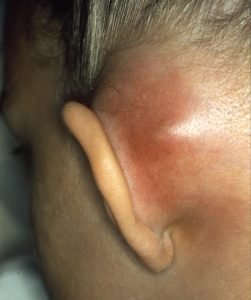This post may contain Amazon® product affiliate links. We may receive a commision if you make a purchase after clicking on one of these links but at no cost to you. Please visit Our Disclosure Page for more information. Thank you.

Image by © Royalty-Free/Corbis
Chronic high-pitched ringing in the ears is a condition that’s known as tinnitus. This condition is not considered a disease, but can occur as a symptom of a more serious condition. Statistics across the country have shown that it affects one in six people. While the high pitched ringing in ears can be considered extremely annoying, most causes of tinnitus are not due to serious health conditions. When the underlying cause has been determined by the physician, tinnitus will usually resolve on its own within a few days or weeks. When a physician is unable to pinpoint the cause of tinnitus, a patient must learn how to live with this condition. In cases such as these, the physician will recommend that a patient meet with an audiologist in order to find a treatment that effectively allows them to live with their tinnitus.
Disorders that Cause Hight Pitch Tone
Labyrinthitis is an ear disorder that’s characterized by the inflammation of the inner ear. When the inner ear becomes inflamed it can interfere with a person’s hearing ability and their balance. This can result in tinnitus, vertigo and the inability to focus the eyes, vomiting, nausea and loss of balance and coordination. Excessive smoking and alcohol abuse can increase the risk of developing this disorder. While it usually goes away without medical treatment in a few weeks, medication may be needed in order to alleviate more severe symptoms. Medications commonly prescribed for labyrinthitis can include medication to reduce vomiting and nausea, antihistamines and anti-inflammatory drugs.
Meniere’s disease is characterized by changes in the volume or composition of the fluid in the inner ear. When a person moves their head this fluid moves as well and will send nerve signals to the brain regarding the body’s position. Composition or volume changes in the fluid can result in abnormal signals sent to the brain, which will cause vomiting, nausea, tinnitus, increased sweating or dizziness. Meniere’s disease has no cure, but the symptoms can usually be controlled successfully by reducing the body’s ability to retain excessive amounts of fluid. This can be accomplished by following a diet that’s low in sodium and through the routine use of diuretics. Severe cases of Meniere’s disease can require surgery in which a portion of the inner ear is removed in order to prevent the symptoms from reoccurring. Surgery is usually only used in extreme cases because it will result in hearing loss.
When Surgery is required in Order to Treat Tinnitus
 Incision Acoustic neuroma is a slow-growing benign tumor that will develop on a cranial nerve. The cranial nerve runs from the brain to the inner ear. The cause of this condition is unknown, but researchers believe genetics to be a factor. As this slow growing tumor gets bigger it will exert pressure on the cranial nerves, which will result in hearing loss, numbness, tinnitus, dizziness, loss of balance and weakness. If the tumor is small, surgery is usually not required. Once the tumor becomes larger, surgery for removal or radiation therapy can be used to relieve symptoms and treat the condition.
Incision Acoustic neuroma is a slow-growing benign tumor that will develop on a cranial nerve. The cranial nerve runs from the brain to the inner ear. The cause of this condition is unknown, but researchers believe genetics to be a factor. As this slow growing tumor gets bigger it will exert pressure on the cranial nerves, which will result in hearing loss, numbness, tinnitus, dizziness, loss of balance and weakness. If the tumor is small, surgery is usually not required. Once the tumor becomes larger, surgery for removal or radiation therapy can be used to relieve symptoms and treat the condition.
